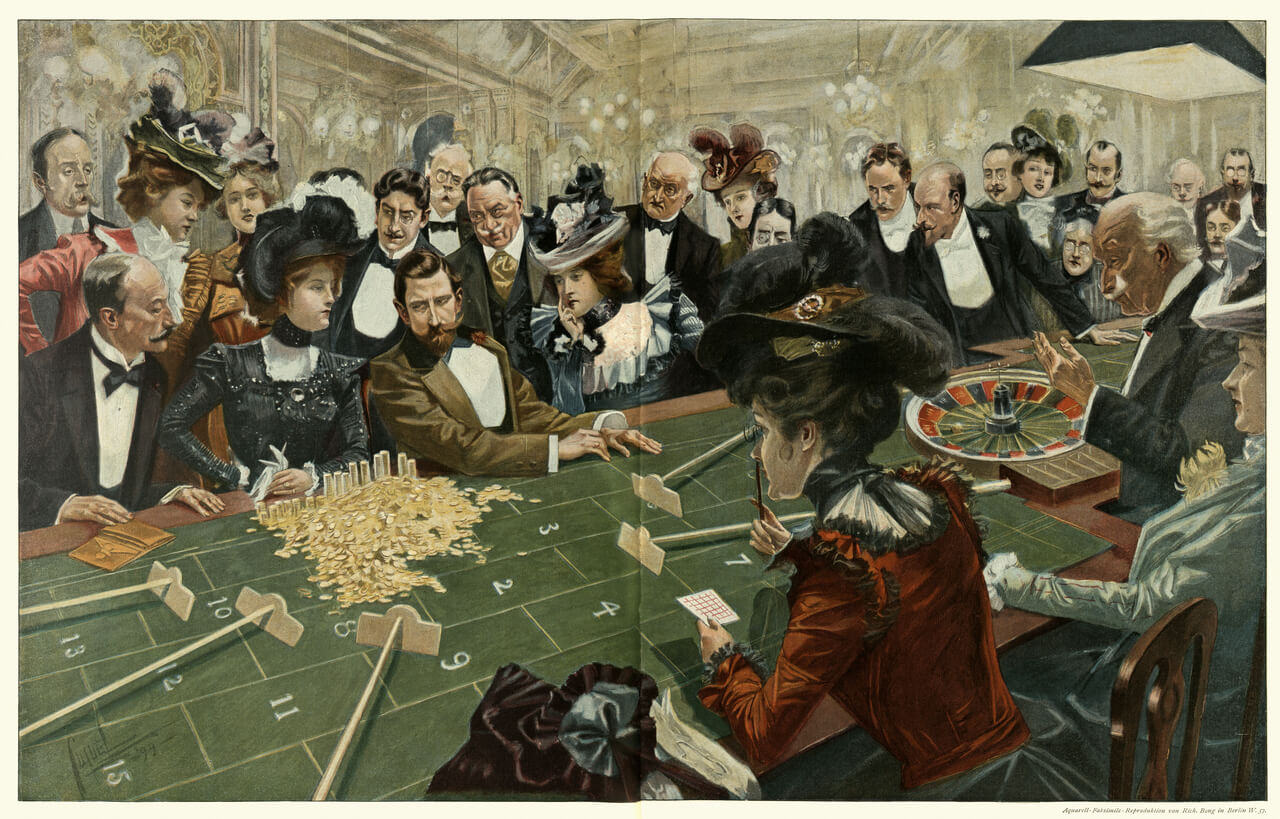History of Gambling: A Detailed Walkthrough From The Start
The history of gambling dates back to ancient civilizations, spanning across cultures and technological eras. Let PeakyCasino walk you through its revolution and explore why it has become one of the most popular pastimes worldwide.
What Is The Earliest Evidence of Gambling?
The earliest evidence of gambling dates back to 2300 BC in China, according to Local History.
Ancient Chinese played keno: the cards were marked with numbers from 1 to 80, arranged in squares. Each player picked a group of numbers they believed would win. Once all players made their selections, a random draw occurred to reveal all the winning numbers.
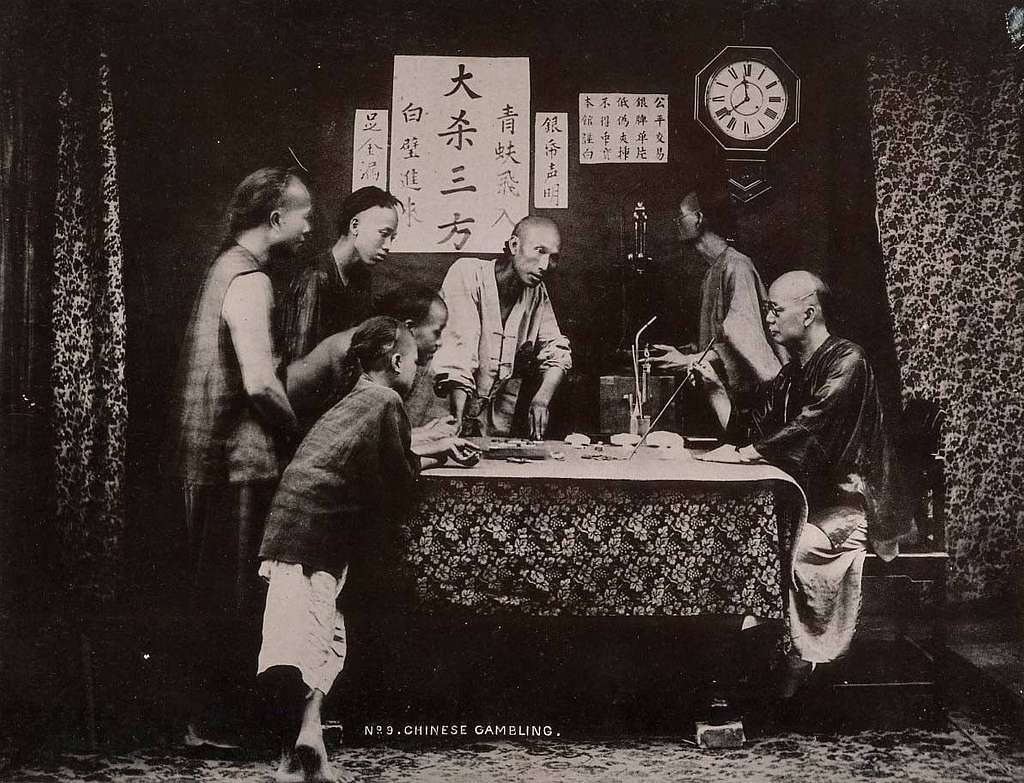
Gambling spread from China to other countries (Source: picryl.com)
History of Gambling: 11 Key Milestones
Gambling started in Ancient China around 2300 BC with keno slips and lottery-style games. The 17th century saw the first casinos in Italy, and the industry then evolved with the launch of online gambling in 1994.
1. 2300 BC: Ancient Beginnings in China
The earliest evidence of gambling was found in Ancient China. Archaeologists discovered tiles that appear to be a part of a lottery-style game. Historical texts like the Book of Songs also reference drawings of wood as an early gambling practice.
Around 2300 BC, the Chinese used keno slips to fund public projects, including the foundation of the Great Wall of China. Over time, lotteries became a common way to raise money, a practice that continues even today.
2. 500 BC: Early Gaming Chips in Ancient Rome
By 500 BC, both Romans and Ancient Greeks enjoyed gambling activities in every aspect of life. However, gambling was illegal in Rome at the time, and anyone caught faced a fine worth 4 times their bet.
To avoid punishment, Romans created the first-ever gambling chips to claim they were playing for tokens instead of real money.
3. 800 AD: Playing Cards: Another Chinese Invention
The Chinese invented playing cards during the 19th century, though the exact games played with them remain in debate.
Historians believe the cards served both as a stake and as a game tool, similar to a modern trading card game. Other scholars, on the other hand, argued they were paper versions of Chinese dominoes.
Regardless, these early cards looked very different from today’s 52-card decks, which shows how the card game has evolved over the centuries.
4. 1400s: The Early Version of Baccarat
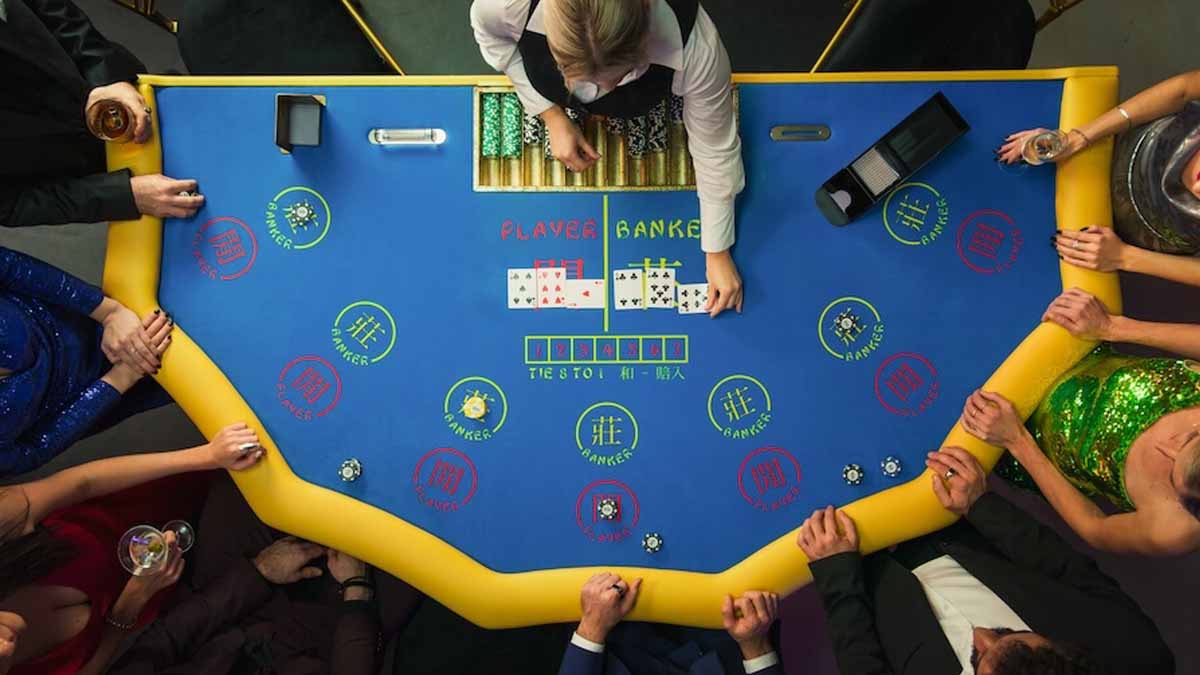
Baccarat originated in Italy
Baccarat, the oldest casino game still played today, originated in Italy in the 1400s and later spread to France.
Over time, the game kept changing before turning into its current modern version and reaching the United States from Cuba. It appeals to high-stakes gamblers and remains a hit in every worldwide casino. Still, people consider it more a casual sport than an active game.
5. 1600: The Development of Blackjack
The roots of blackjack are connected to Spanish and French card games. The Spanish game ventiuna (21) appeared in the early 1600s, while the French game vingt-et-un (also 21) became a direct predecessor of modern blackjack.
French settlers introduced the game to the U.S., where it quickly gained popularity. Later, the term “blackjack” originated in 1930s Nevada casinos, where players received special payouts for winning hands featuring a black Jack of Clubs.
6. 1638: The First Gambling Houses (Casinos)
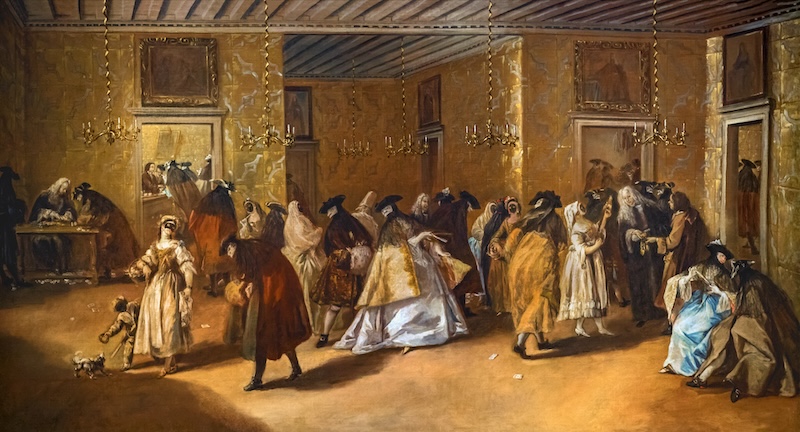
Ridotto was the first public gambling house (wikipedia).
The first gambling house, similar to modern casinos, appeared in Italy in the early 17th century, marking the beginning of the casino industry.
In 1638, Venice opened the Ridotto, a regular space for gambling during carnival season. By the 19th century, casinos had spread across Europe. Informal gambling casinos also flourished in the United States, especially on the Mississippi River steamboats.
7. 1796: The Spread of Roulette in Paris
Roulette first appeared in the 18th century in Paris. At the time, it used a wheel similar to the American Roulette wheel today, with both single and double zeros.
Fifty years later, the European variant with just one zero was introduced to offer better odds for players. This version became popular worldwide during the 19th century, particularly after Monte Carlo casinos adopted it. Nevertheless, American casinos continued to use the double-zero format, which remains standard in the U.S. today.
8. 1829: Poker Became A Global Phenomenon
To this day, the exact origin of poker is still in debate. Nevertheless, it evolved over centuries from varying card games, such as the 17th-century French and Persian Poque.
The first recorded instance of a poker game was in 1829 in New Orleans, reported by Joseph Crowell, an English actor. Its growth was slow until the 1970s when a world poker tournament in Las Vegas, the World Series of Poker, began gaining attention.
After that, poker’s popularity quickly skyrocketed. There were even televised poker events in the early 2000s to let viewers see players’ hands.
9. 1891: The Rise of Slot Machines in New York
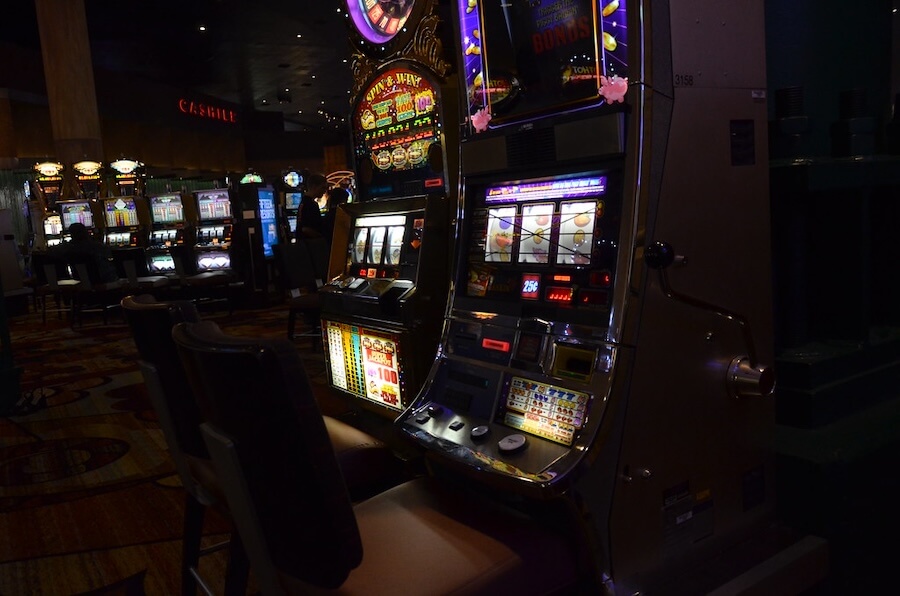
Slot machines became widespread (source: flickr.com)
The early gambling machines resembling modern slots appeared in the late 19th century.
In New York, Pitt and Sittman created a device using drum reels with 52 playing cards to mimic poker. Around that same year, Charles Fey from San Francisco invented Liberty Bell machines, which simplified gameplay and allowed automatic, precise payouts.
These machines dispensed gum or cigars as prizes at first, but soon, money-pay variants quickly became popular in casinos and bars worldwide.
1976 marked the birth of the first-ever video slot, which laid the foundation for today’s video slots. The bell symbols in these modern online slots are a nod to Fey’s original design.
10. 1994: The Birth of Online Gambling
With the rise of the Internet in 1983 (University System of Georgia), a wave of online gambling emerged.
Microgaming, a leading casino game developer, launched the first online casino in 1994. The event marked the start of online gambling, and this industry quickly became worth over 1 billion dollars within just five years.
In 2003, Playtech introduced live dealer casinos, which blended the traditional casino experience with virtual gaming.
Thanks to both Microgaming and Playtech, online gambling has now expanded into a multibillion-dollar industry with thousands of online casinos (e.g., Draftkings, BetMGM, FanDuel, etc.) and online betting pages (e.g., Paripesa, Helabet, Parimatch, etc.).
Players from all over the world can sign up and explore the games, from slots and table games to card games, conveniently as long as they have a computer/laptop and access to the Internet.
11. 2000s: Gambling Went Mobile
When online gambling first emerged, players primarily accessed games on desktop computers. However, since the first introduction of the Snake game on Nokia in 1997, both the gaming and gambling industries began to experience a major shift toward mobile devices, like smartphones, tablets, etc..
By 2024, players have transitioned from desktops to mobile online casinos, such as High 5 Casino, Lucky Bird, Stake, etc., to enjoy gambling anywhere and anytime. According to the report from Market Research Future, the mobile gambling market is expected to grow to over 189.5 billion USD by 2032.
As gambling grew in popularity, smaller niches like sports gambling (or sports betting) have also emerged and evolved.
History of Sports Gambling
Sports gambling started with the Ancient Greeks betting on Olympic games 2000+ years ago. By the nineteenth century, the 1853 Betting Act had pushed it into formal venues, and betting shops had also been legalized.
- 2000+ years ago: Ancient Greeks bet on Olympic events. Romans wagered on sports competitions, gladiator fights, and other public spectacles despite occasional bans.
- 1190: France and England introduced the first sports gambling law to regulate betting and control morality.
- 1700s: Harry Ogden introduced odds for horse racing, which led to a profitable and more systematic approach to sports betting. It also marked the start of modern bookmakers.
- 19th century: UK laws (like the 1853 Betting Act and the 1845 Gaming Act) curbed illegal gambling and managed disputes. On-street betting was restricted, pushing sports gambling into formal venues.
- 1960s: The 1960 Betting and Gaming Act legalized betting shops, leading to thousands opening across the UK. Tele-betting (bets by phone) also became legal.
- 1990s: Aside from the first virtual casino, Microgaming also launched the first online sportsbook. In 1996, Intertops accepted the first online sports bet and started a new era of wagering.
Gambling and sports betting are still growing with no signs of slowing down. Let’s discuss what the future holds for players in 2025 and beyond.
What Comes Next?
In the next 5 years, online gambling will still be dominant:
- Operators focus on optimizing mobile apps to increase speed and ease of use, ensuring smooth gaming even on lower-end devices.
- Live dealer games with AR/VR also grow more popular; they allow players to put on a VR headset, enter a virtual casino, and interact with live dealers and other players in real time.
- Players have the option to bet on AI-driven horse races or soccer matches that run 24/7, independent of real-world schedules.
FAQs
When did casino games appear?
Who invented casino gambling?
Is gambling actually random?
Who was the biggest gambler ever?
Is gambling a sin in God’s eyes?
Did Jesus forbid gambling?
References
- The history of gambling (Gambling.net)
- Regulation and the Rise of gambling industry (Academic.oup.com)
- From Ancient Times to the Present Day (Localhistories.org)
- The History of Sports Betting (Delasport.com)
- Mobile Gambling Market (marketresearchfuture.com)
- A Brief History of the Internet (usg.edu)
